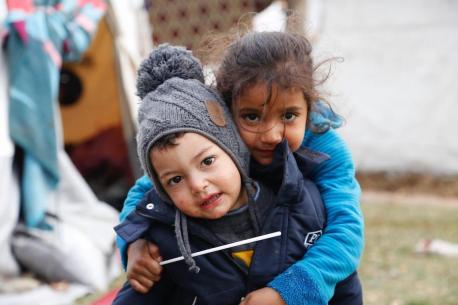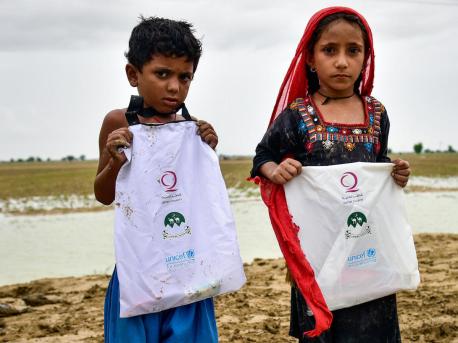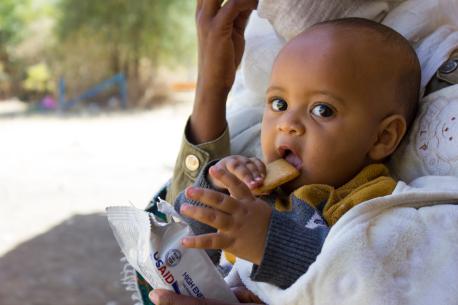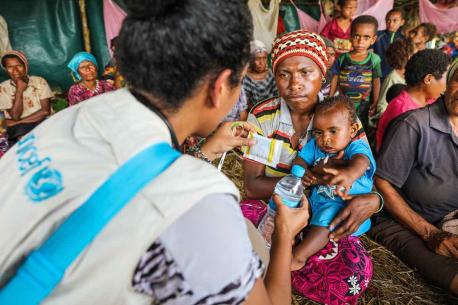
In Times of Emergency, UNICEF Steps Up
As the lead humanitarian agency for children in emergencies, UNICEF has a 70-year history of being in the right place at the right time.
Today, a vast number of protracted, increasingly complex humanitarian crises have stolen the childhoods of millions of children. More countries are embroiled in violent unrest and conflicts than at any other time in the past 30 years, and roughly 420 million kids are paying the price.
In places like Syria, Yemen and the Central African Republic, children fall victim to deadly diseases and other preventable conditions that healthcare systems ravaged by war are powerless to stop. In Bangladesh, 500,000 Rohingya refugee children who fled genocide in Myanmar are completely reliant on humanitarian relief.
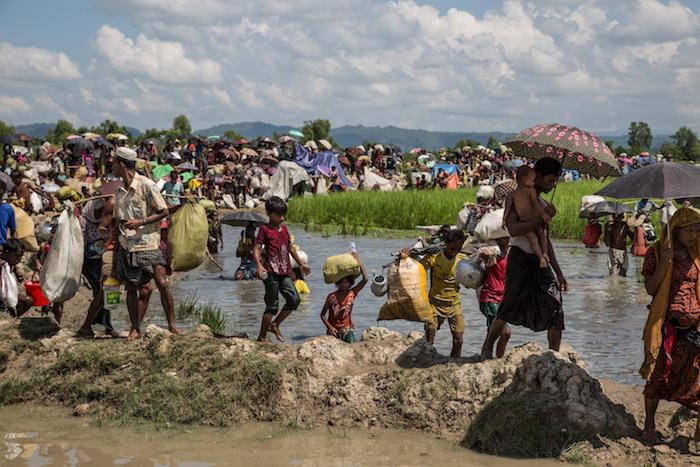
In August 2017, after they became the targets of a military-led campaign of brutal violence, an estimated 900,000 Rohingya began fleeing Myanmar’s Rakhine state into Bangladesh. They settled in Cox’s Bazar, where hills were quickly cleared of trees and vegetation to accommodate the massive influx of traumatized families and children. © UNICEF/UN0136208/LeMoyne
Natural disasters, refugee crises, conflict and famine are putting more lives in jeopardy every day
The escalating threats to children aren't only man-made. Today, around the world, extreme weather — typhoons, cyclones, floods and a series of earthquakes and volcanic eruptions — have heightened the risks children face. In March and April this year, Cyclones Idai and Kenneth struck central and northern Mozambique. The two storms, which brought widespread flooding, destroyed nearly 5,000 square miles of farmland, creating food shortages and a nutritional crisis that now threatens nearly 1 million people, including 160,000 children under five.
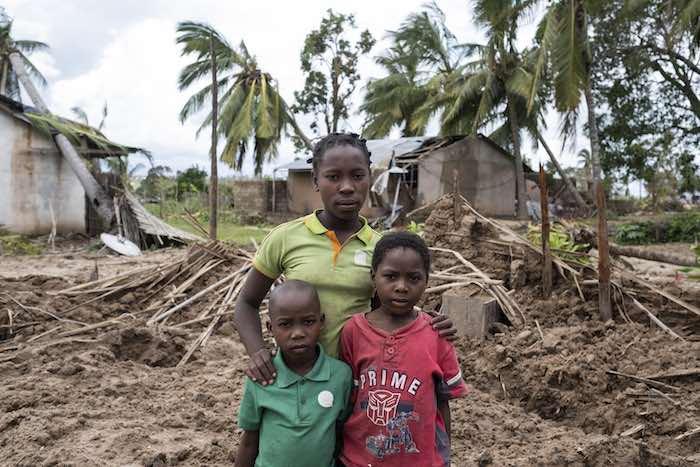
Joana, 13, Maisinha, 8, and Inaciao, 6, lost their home during Cyclone Kenneth. Joana said that since the cyclone she has just felt sad: "I would like to go back to school, and get clothes as they have all gone. I am feeling bad and hungry because there is no food." © UNICEF/UN0308581/De Wet
13-year-old Jonana, who is now homeless along with her younger sister and brother, says that since the cyclone she has just felt sad: "I would like to go back to school, and get clothes as they have all gone. I am feeling bad and hungry because there is no food."
"I would like to go back to school, and get clothes as they have all gone. I am feeling bad and hungry because there is no food," — Joana, 13
When Cyclones Idai and Kenneth plunged hundreds of thousands of children like Joana into deprivation and chaos, UNICEF rushed to meet their immediate needs for water, nutrition, health care and protection. Six months later, UNICEF is still there, drawing upon its 70-plus-years of experience to help them and their families rebuild their lives.
"UNICEF is serving and protecting the most vulnerable children who are living through conflict and crisis. If we do not stand by these children, who will?" says UNICEF Executive Director Henrietta H. Fore.
Ready to deploy at a moment's notice
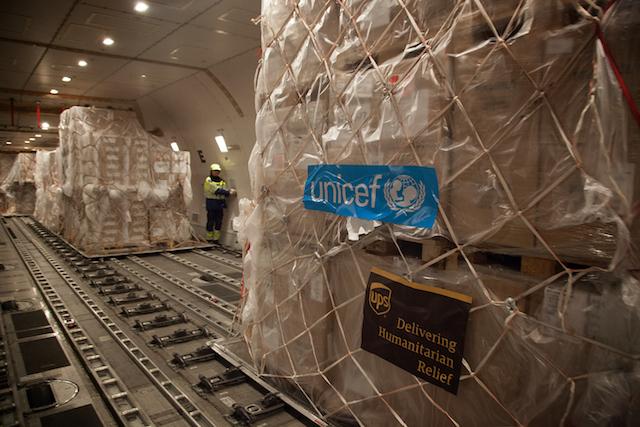
A B-747 flight donated by the UPS Foundation touched ground in Port-au-Prince, carrying 100 tons of UNICEF emergency medical and educational supplies packed in UNICEF’s Global Supply Warehouse in Copenhagen. © UNICEF/UN036396/Guhle
Key to UNICEF's effectiveness is its humanitarian warehouse in Copenhagen. There, drinking water, nonperishable nutrition, medicines and emergency kits are ready to deploy at a moment's notice. The Copenhagen warehouse, the world's largest, can ship emergency supplies anywhere in the world in 48 to 72 hours.
That means that wherever and whenever children need help, UNICEF can mobilize quickly — just as it did in September 2018, when an earthquake struck the Indonesian island of Sulawesi, killing over 2,000 people and seriously injuring 4,400 others. The 7.5 magnitude quake, which was followed by a tsunami, left 525,000 children without essential nutrition, health and education services.
"If we do not stand by these children, who will?"
In the initial response, UNICEF helped reunite lost children with their families and provided emotional support to 21,000 traumatized kids and teens. Since then, UNICEF has provided nutritional counseling to 72,000 parents of babies and small children and helped vaccinate 776,000 kids against measles and rubella. As of the first anniversary of the earthquake, UNICEF had helped deliver safe drinking water, sanitation and hygiene services to 750,000 people.
When disaster strikes, UNICEF is among those first on the ground, assessing needs with partners to decide what children need most. UNICEF is also one of the last relief organizations to leave, because building sustainable solutions to the problems children face is core to every emergency response. In recent months, UNICEF has helped the Indonesian government conduct a safety assessment of schools damaged in the earthquake. Out of 1,200 buildings, just 135 have been declared safe, which leaves thousands of children studying in temporary learning spaces.
In the coming months and years, getting children back in permanent schools and finding homes for the 57,000 people who are still living in camps and shelters is a priority for UNICEF and its partners.
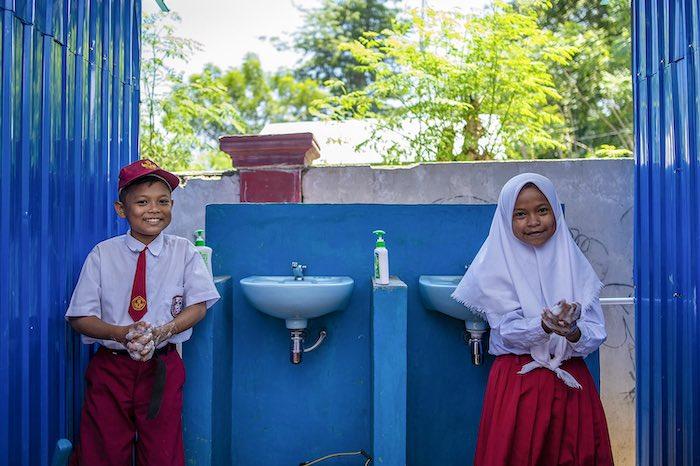
Biyan, 12 (left), and Sisil, 12, go to a school in Central Sulawesi that was damaged by the 7.5-magnitude earthquake that rocked Indonesia on September 28, 2018. But UNICEF helped make the school safe for their return by providing toilets, handwashing facilities and hygiene training for teachers as part of the emergency and recovery response. © UNICEF/UNI206458/Wilander
In any humanitarian emergency, UNICEF puts children first, ensuring that they have what they need to survive the initial impact and then get back to being kids again. In 2018 alone, UNICEF:
- Responded to nearly 300 humanitarian emergencies
- Treated 4 million children for malnutrition
- Helped supply safe drinking water to nearly 19 million people
- Protected 65.5 million children from Diphtheria, Tetanus, Hepatitis B and other deadly diseases
- Gave 3.6 million girls and boys in crisis counseling and emotional support
- Helped 6.9 million children in emergencies get an education
As the lead humanitarian agency looking out for children when emergencies strike, UNICEF knows what children need to survive difficult times. Just as important, UNICEF has empowering programs and tools to help kids process their trauma and move ahead, ready to learn and plan for a brighter future.
Please help UNICEF help children in crisis.
Top photo: In humanitarian crises, UNICEF’s longstanding priority is to prevent death from starvation and disease and to reduce malnutrition. Here, in Mauritania, which has long struggled with food insecurity and high rates of malnutrition, a health worker at a UNICEF-supported nutrition center in the southern Gorgol Region comforts 7-month-old Kumbaba and his mother Oumou Sy. Leaving her two other children behind, the concerned mom journeyed from her rural village to seek treatment for her severely malnourished baby. © UNICEF/UN0152982/Brandt
